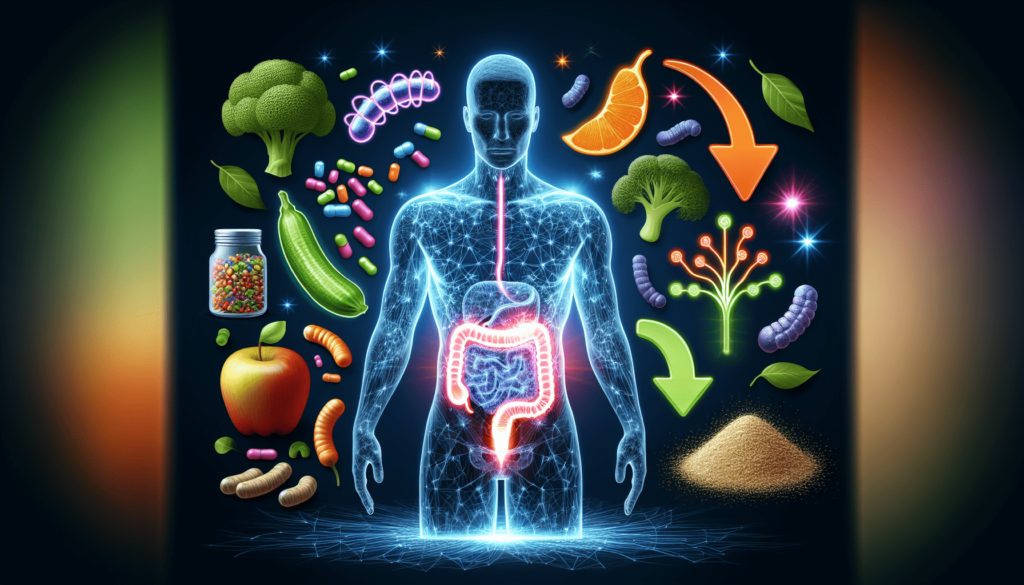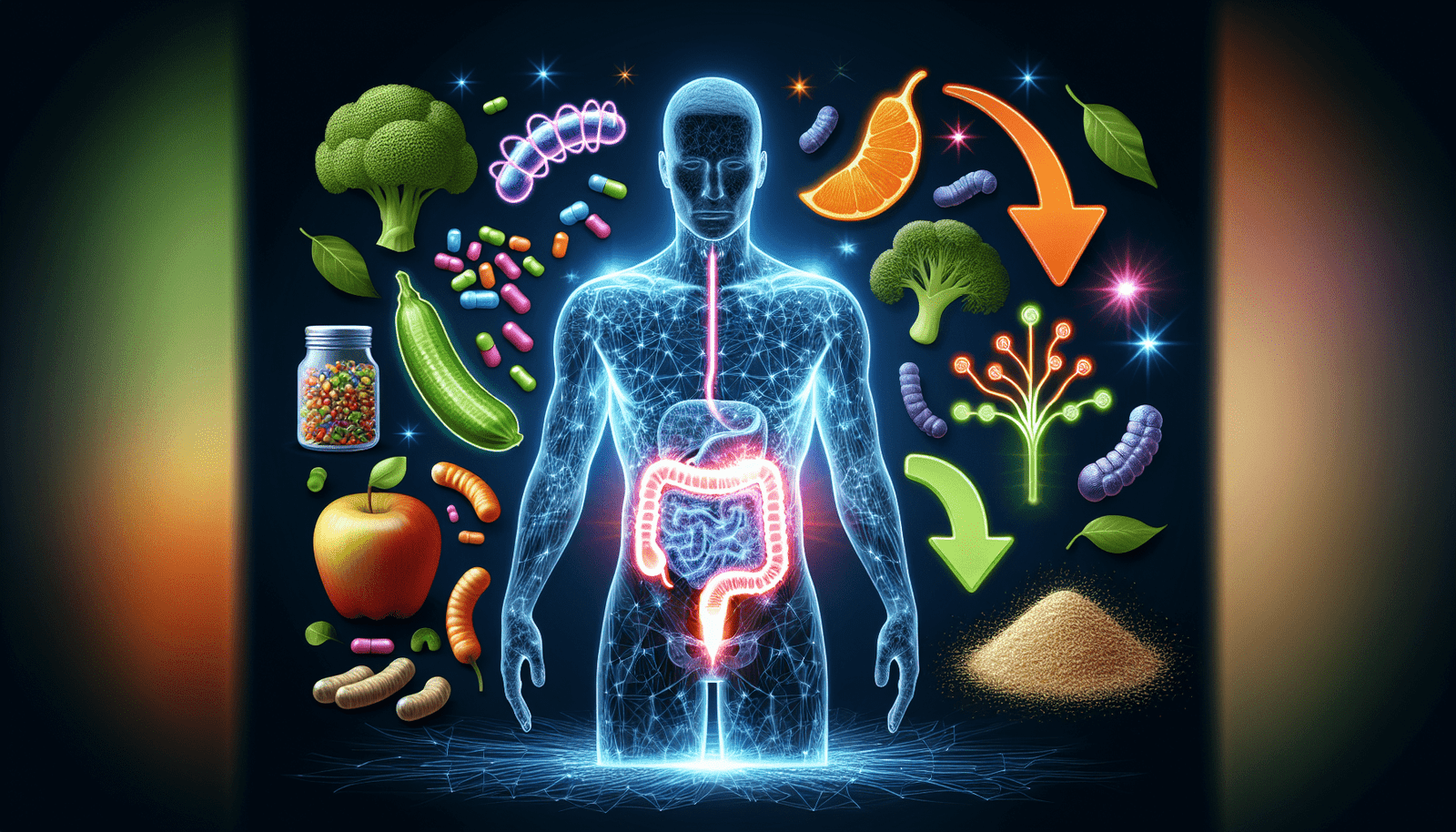Are you striving to shed those extra pounds and improve your overall health? Look no further than the power of gut health. In this article, we will explore effective strategies to harness the potential of your gut for weight loss. By understanding the importance of a healthy digestive system and implementing simple yet impactful lifestyle changes, you can attain your weight loss goals and experience a multitude of benefits for your overall well-being. So, let’s delve into the world of gut health and discover strategies that truly work.

Understanding Gut Health
What is Gut Health?
Gut health refers to the overall well-being and functionality of the digestive system. It encompasses the balance of microorganisms in the gut, the integrity of the intestinal lining, and the efficient breakdown and absorption of nutrients. A healthy gut is crucial for not only digestive health but also for maintaining a strong immune system and overall well-being.
The Role of Gut Microbiota
Gut microbiota refers to the trillions of microorganisms that inhabit our digestive system. These microorganisms, including bacteria, viruses, and fungi, play a vital role in maintaining gut health. They help with nutrient absorption, aid in digestion, produce essential vitamins, and support a strong immune system. Maintaining a diverse and balanced gut microbiota is crucial for optimal gut health and overall wellness.
Importance of Gut Health for Weight Loss
When it comes to weight loss, a healthy gut plays a significant role. An imbalance in gut microbiota, also known as dysbiosis, has been linked to obesity and weight gain. Studies have shown that individuals with a healthy gut microbiota have a higher metabolic rate, better insulin sensitivity, and reduced inflammation, all of which contribute to weight loss. By improving your gut health, you can enhance your weight loss efforts and achieve long-term success.
Factors Affecting Gut Health
Dietary Factors
Diet plays a crucial role in determining the health of your gut. A diet rich in fiber, whole grains, fruits, and vegetables promotes the growth of beneficial bacteria and helps maintain a balanced gut microbiota. On the other hand, a diet high in processed foods, sugar, and unhealthy fats can disrupt the delicate balance of gut microbiota and lead to inflammation and various digestive issues.
Lifestyle Factors
Apart from diet, various lifestyle factors can impact gut health. Stress, lack of sleep, sedentary lifestyle, and excessive alcohol consumption can all have detrimental effects on the gut microbiota. It is important to prioritize a balanced lifestyle that includes regular exercise, adequate sleep, stress management techniques, and moderation in alcohol consumption to support a healthy gut.
Stress and Gut Health
The gut and brain are closely connected through the gut-brain axis. This axis allows communication between the gut and the brain, influencing various physiological processes, including digestion and stress response. Chronic stress can disrupt gut health by altering the composition of gut microbiota, increasing intestinal permeability, and triggering inflammation. Managing stress through techniques like meditation, deep breathing, and regular exercise can help support a healthy gut.
Probiotics and Prebiotics
What are Probiotics?
Probiotics are live bacteria and yeasts that are beneficial for gut health when consumed in adequate amounts. They can be found in certain foods or taken in the form of supplements. Probiotics work by colonizing the gut and promoting the growth of beneficial bacteria, thus improving the balance of gut microbiota.
Benefits of Probiotics for Gut Health
Probiotics offer numerous benefits for gut health. They help maintain a balanced gut microbiota, improve digestion, reduce inflammation, and enhance immune function. Certain strains of probiotics have also shown promise in alleviating symptoms of irritable bowel syndrome (IBS) and inflammatory bowel disease (IBD). Additionally, some evidence suggests that certain probiotics may aid in weight loss by reducing belly fat and improving metabolism.
Sources of Probiotics
Probiotics can be found in various fermented foods such as yogurt, kefir, sauerkraut, kimchi, and kombucha. It is important to choose products that contain live and active cultures to ensure the presence of beneficial bacteria. If you prefer taking probiotics in supplement form, consult with a healthcare professional to choose the right strain and dosage.
What are Prebiotics?
Prebiotics are a type of dietary fiber that serves as a food source for probiotics. They are not digested by the body but instead undergo fermentation in the gut, promoting the growth of beneficial bacteria. Consuming prebiotic-rich foods helps create an environment in the gut that is conducive to a healthy gut microbiota.
Benefits of Prebiotics for Gut Health
Prebiotics offer several benefits for gut health. They help nourish beneficial bacteria, enhance mineral absorption, support bowel regularity, and reduce inflammation in the gut. By incorporating prebiotics into your diet, you can promote the growth of healthy bacteria and support overall gut health.
Sources of Prebiotics
Prebiotics can be found in foods such as onions, garlic, leeks, asparagus, bananas, oats, and flaxseeds. Including these fiber-rich foods in your diet can help support the growth of beneficial bacteria in your gut. It is important to gradually increase your intake of prebiotics to minimize any digestive discomfort.

Balancing Gut Microbiota
Maintaining a Diverse Diet
Eating a diverse range of foods is essential for maintaining a diverse and balanced gut microbiota. Incorporating a variety of fruits, vegetables, whole grains, legumes, and fermented foods into your diet introduces different types of nutrients and fiber that promote the growth of diverse beneficial bacteria.
Fiber-Rich Foods
Fiber is an essential component of a healthy diet, and it plays a crucial role in gut health. Soluble fiber, found in foods like oats and beans, acts as a prebiotic, feeding beneficial bacteria in the gut. Insoluble fiber, present in foods such as whole wheat, vegetables, and nuts, helps promote regular bowel movements, supporting a healthy gut.
Avoiding Excessive Antibiotic Use
While antibiotics can be life-saving medications, their overuse or misuse can have detrimental effects on gut health. Antibiotics not only kill harmful bacteria but also eliminate beneficial bacteria in the gut, disrupting the balance of gut microbiota. Whenever possible, it is advisable to discuss alternative treatment options with your healthcare provider. If antibiotics are necessary, consider probiotic supplementation to support gut health during and after treatment.
Reducing Inflammation
Anti-Inflammatory Diet
Inflammation in the gut can contribute to various digestive disorders and hinder weight loss efforts. Following an anti-inflammatory diet rich in fruits, vegetables, fatty fish, nuts, seeds, and healthy fats can help reduce inflammation in the gut. Avoiding processed foods, refined sugars, and unhealthy fats is crucial in maintaining gut health and managing inflammation.
Omega-3 Fatty Acids
Omega-3 fatty acids have been shown to have anti-inflammatory properties and can help support a healthy gut. Fatty fish such as salmon, mackerel, and sardines are excellent sources of omega-3 fatty acids. If you do not consume fish, consider incorporating plant-based sources like flaxseeds, chia seeds, and walnuts into your diet.
Turmeric and Ginger
Turmeric and ginger are well-known for their anti-inflammatory properties. Curcumin, the active compound in turmeric, and gingerol, the active compound in ginger, have been shown to reduce inflammation in the gut. Adding these spices to your meals or incorporating them into tea can provide additional support for gut health.
Probiotics and Inflammation
Certain strains of probiotics have been found to have anti-inflammatory effects in the gut. Lactobacillus acidophilus, Bifidobacterium longum, and Lactobacillus rhamnosus are examples of probiotic strains that have shown promise in reducing gut inflammation. Including probiotic-rich foods or supplements in your routine can help support a healthy gut and alleviate inflammation.
Exercise and Gut Health
The Gut-Brain Axis
The gut and brain communicate through the gut-brain axis, a complex network of nerves, hormones, and neurotransmitters. Regular exercise has been shown to positively influence the gut-brain axis, promoting the release of beneficial neurotransmitters and supporting overall gut health.
Effects of Exercise on Gut Microbiota
Studies have found that exercise can have a positive impact on gut microbiota. Physical activity has been shown to increase the diversity and abundance of beneficial bacteria in the gut, thus contributing to a healthy gut microbiome. Incorporating regular exercise into your routine can help support a healthy gut and improve overall well-being.
Cardiovascular Exercise
Cardiovascular exercises, such as running, cycling, or swimming, have been shown to have positive effects on gut health. These types of exercises increase blood flow to the intestines, supporting healthy digestion and nutrient absorption. Aim for at least 150 minutes of moderate-intensity aerobic activity per week for optimal gut health.
Strength Training
Strength training exercises, such as weightlifting or bodyweight exercises, also offer benefits for gut health. Strength training has been shown to improve insulin sensitivity, promote a healthy metabolism, and reduce inflammation, all of which contribute to a healthy gut and support weight loss efforts. Include strength training exercises at least twice a week to optimize gut health.
Fasting and Gut Health
Intermittent Fasting
Intermittent fasting is an eating pattern that cycles between periods of fasting and eating. It has gained popularity for its potential benefits for gut health and weight loss. Intermittent fasting has been shown to improve the diversity of gut microbiota, reduce inflammation, and enhance metabolic function. However, it is important to approach intermittent fasting with caution and seek guidance from a healthcare professional, as it may not be suitable for everyone.
Time-Restricted Eating
Time-restricted eating involves limiting the daily feeding window and fasting for the remaining hours of the day. This approach allows the gut time to rest and repair, promoting optimal gut health. Evidence suggests that time-restricted eating can improve digestion, regulate appetite, and support weight loss. Start by gradually reducing the eating window and experiment with different fasting intervals to find what works best for you.
Effects on Gut Health and Weight Loss
Both intermittent fasting and time-restricted eating have shown promising effects on gut health and weight loss. These approaches help create a favorable environment in the gut, promote the growth of beneficial bacteria, reduce inflammation, and enhance metabolic function. However, it is important to note that sustainable weight loss requires a comprehensive approach that includes a balanced diet and regular physical activity.
Reducing Stress
Stress and Gut Health Connection
The gut and brain are intricately connected, and stress can have a significant impact on gut health. Chronic stress can disrupt the delicate balance of gut microbiota, increase intestinal permeability, and contribute to digestive disorders. Managing stress is crucial for maintaining a healthy gut and overall well-being.
Stress Reduction Techniques
Incorporating stress reduction techniques into your daily routine can help support gut health. Techniques such as meditation, deep breathing exercises, and mindfulness have been shown to reduce stress levels and positively impact gut health. Find activities that help you relax and make time for them regularly.
Meditation and Mindfulness
Meditation and mindfulness practices have been found to have a positive effect on gut health. These practices help activate the relaxation response, reduce stress hormones, and improve gut motility. Consider integrating guided meditation or mindfulness exercises into your daily routine to support your gut health.
Exercise and Stress Reduction
Regular exercise not only supports gut health but also helps reduce stress levels. Physical activity stimulates the release of endorphins, which are known as “feel-good” hormones, promoting overall well-being and stress reduction. Find an exercise routine that you enjoy and make it a priority in your life.
Avoiding Gut Health Disruptors
Processed Foods
Processed foods, such as refined grains, sugary snacks, and packaged meals, can be detrimental to gut health. These foods are often low in fiber and high in unhealthy fats and artificial additives, disrupting the balance of gut microbiota and promoting inflammation. Opt for whole, unprocessed foods whenever possible to support a healthy gut.
Artificial Sweeteners
Artificial sweeteners, commonly found in diet soda, sugar-free snacks, and some processed foods, have been shown to negatively impact gut health. Research suggests that artificial sweeteners can alter the composition of gut microbiota, increase glucose intolerance, and contribute to obesity. Limit your consumption of artificial sweeteners and opt for natural sweeteners like stevia or honey when needed.
Alcohol and Gut Health
Excessive alcohol consumption can have a negative impact on gut health. Alcohol disrupts the balance of gut microbiota, increases intestinal permeability, and promotes inflammation in the gut. It is important to consume alcohol in moderation and be mindful of its potential effects on gut health.
Smoking and Gut Health
Smoking has been linked to numerous health issues, including negative effects on gut health. Smoking disrupts the balance of gut microbiota, increases the risk of digestive disorders, and impairs the healing of the gut lining. Quitting smoking is crucial for promoting gut health and overall well-being.
Seeking Professional Guidance
Consulting a Registered Dietitian
If you are struggling with gut health or weight loss, consulting a registered dietitian can be beneficial. A registered dietitian can assess your individual needs and create a personalized plan to improve your gut health. They can provide guidance on appropriate probiotic and prebiotic supplementation, as well as help you develop a balanced and nutrient-rich diet to support optimal gut health.
Working with a Nutritionist
A nutritionist can also provide valuable guidance and support in improving gut health. They can help you identify dietary triggers that may be contributing to gut issues and develop a customized nutrition plan to address your specific needs. Working with a nutritionist can help ensure that you are making informed choices that support your gut health and weight loss goals.
Medical Support for Gut Health
In some cases, medical support may be necessary to address gut health issues. If you are experiencing chronic digestive symptoms or have been diagnosed with a specific condition, such as irritable bowel syndrome (IBS) or inflammatory bowel disease (IBD), it is important to work closely with a healthcare professional. They can provide appropriate medical interventions and guide you in managing your gut health effectively.
In conclusion, understanding and supporting gut health are essential for weight loss and overall well-being. By incorporating strategies such as maintaining a diverse and balanced diet, incorporating probiotics and prebiotics, reducing inflammation, engaging in regular exercise, practicing stress reduction techniques, avoiding gut health disruptors, and seeking professional guidance when needed, you can improve your gut health and achieve your weight loss goals. Remember, a healthy gut is the foundation for a healthy body and mind, so prioritize your gut health to reap the benefits in all aspects of your life.

